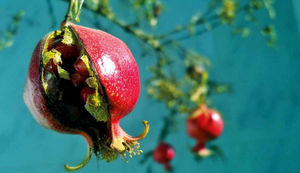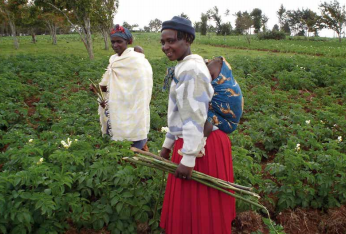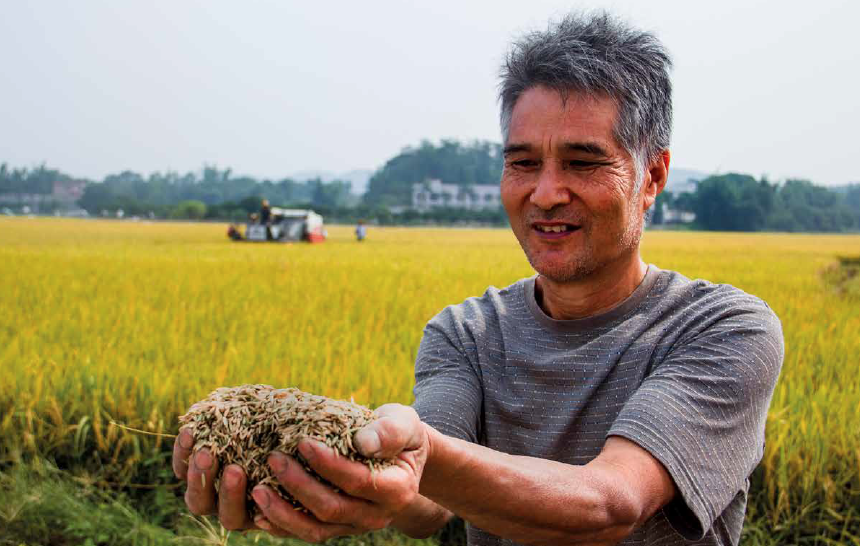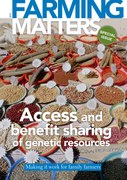This special issue of Farming Matters magazine has explored the ways in which access and benefit sharing of plant genetic resources can work for family farmers. On one hand it presents cases that demonstrate the limited extent to which family farmers have been able to benefit from the ‘formal’ ABS process: the rather complex arrangements between international agreements and national authorities, institutions and communities. On the other hand, this publication uncovers some of the effective principles and mechanisms for access and benefit sharing that are part and parcel of farmers’ everyday practices, even when formal ABS regulations have not yet been designed or implemented. What can we conclude?
Formal access and benefit sharing processes are anchored in what may termed the international ‘ABS regime’, which consists of the Convention on Biological Diversity (CBD) and its Nagoya Protocol and the International Treaty on Plant Genetic Resources for Food and Agriculture (ITPGRFA). Both the CBD and the Treaty recognise the role of indigenous groups and family farmers in the conservation and sustainable use of (agro)biodiversity, and both support ABS arrangements, albeit differently. The contributions in this special issue demonstrate that despite the existence of this ABS regime, indigenous groups and family farmers have so far received very limited material and immaterial support from it, due to political, legal and bureaucratic complexities and hurdles, lack of national implementation capacities, and costly operational procedures. At the same time, much can be learned from traditional and newly emerging forms of farmer-centred principles and practices for access and benefit sharing.
Collaboration
The experiences presented here provide valuable insights about what elements of a formal ABS system may work for family farmers. Central to effective ABS arrangements are the practices of collaboration of farmer networks and community seed banks with state actors or professional breeders – in some cases under the CBD and the Nagoya Protocol, and only recently emerging under the Treaty.
A fundamental factor of success is putting farmers at the centre of such collaborations, such as in the case of seed development and improvement seen in China. ‘Professional’ breeders from the Chinese Academy of Agricultural Sciences (the national public breeding institute) and the Guangxi Maize Research Institute are working with farmers to improve an open pollinated maize variety. Farmers benefit through the recognition of their expertise, improved availability of and access to quality seeds from both institutes, income generated from seed production and marketing, and the provision of scientific and technical knowhow through collaboration with the formal seed sector.
A fundamental factor of success is putting farmers at the centre of ABS collaborations with state actors or professional breeders
Under certain circumstances, access and benefit sharing mechanisms can also be established through collaborations of private parties and farmers, as the unique participatory plant breeding tradition based on farmer-selected potato varieties in the Netherlands demonstrates. It is important to note however that a major reason for the success of this initiative is the specific historical context of the Dutch agricultural sector. Decades of public investment in breeding has fostered relationships between farmers and public and private sector breeders.
Collaborations are also successful when they make collections of genetic resources of key crops accessible to family farmers, especially in cases where farmers have little access to quality seed. The initiative of coffee farmers in Costa Rica demonstrates the positive impact of facilitated access of farmers and breeders to the germplasm of horticultural crops. Access to diverse crops is of strategic importance to farmers as it enhances their resilience to climate change and other shocks. This experience points to the need to include horticultural food crops in the multilateral system of the Treaty.
Local community organisations

This publication furthermore highlights how local community organisations can and must play a leading role in the maintenance of the rich bio-cultural heritage embodied in local varieties. State authorities can support such civil society networks in the construction of seed security systems that allow family farmers to build their own food and nutrition strategies as well as increasing their resilience.
An example comes from Paraíba, Brazil, where the state government launched a seed bank policy in order to reinforce existing community seed banks, and donated stocks of seeds as an incentive for communities to construct new seed banks. When local varieties became formally recognised by the national government in 2003, the door was opened to more progressive innovations in the government seed programme. This could only happen through coordinated efforts of farmer networks, government institutions and scientists.
Simplifying the system
Research and capacity building initiatives, such as a Bioversity-led project in eight countries, make an effort to identify ways to strengthen the usefulness of ITPGRFA for farmers. Although significant progress has been made, the project reveals that progress in national implementation of ABS regulation under the Treaty is modest, especially with regards to benefit sharing. In an interview, François Meienberg echoes this observation, noting that under the Treaty’s Benefit Sharing Fund to date no mandatory payment has been made that would allow the sharing of benefits with farmers. This can be considered an injustice created by the system.
François Meienberg proposes to simplify the system: corporations that want to access genetic resources under the multilateral system should contribute a fixed benefit sharing payment on an annual basis. Despite the shortcomings, the Treaty remains important as it offers a legal basis to compel industrial agriculture to repay its dues whenever it sells seeds in a member country, as argued by Guy Kastler. The time has come to make concrete proposals to improve implementation of the Treaty.
Self-organised mechanisms

them with stakes. Photo: Peter Gildemacher
What emerges from the various contributions is that self-organised access and benefit sharing mechanisms can be highly effective for family farmers. Examples are innovative farmer-led seed banking and plant breeding initiatives. They are often based on long standing customary practices and enable family farmers to develop, exchange, sell and use traditional and region specific seed varieties.
In some cases, community seed banks provide an alternative to an ABS regime and may be more effective in protecting biodiversity and encouraging farmers to contribute to the genepool than the formal system. This is the case in India, where Farmers’ Rights are embedded in national law, but implementation poses challenges because of the regulations on trade related aspects of intellectual property rights. In this context of an emerging ABS regime, the TheruBeedi Seed Bank turns out to be very effective in ensuring access and benefit sharing for family farmers. This is also true in Zimbabwe, where smallholder farmers hardly benefit from formal ABS agreements. The Community Technology Development Trust supports alternative mechanisms that have resulted in a substantial increase of farmers’ access to seed diversity and their ability to share in the benefits of the continuing cycles of seed conservation.
Similarly, in the Ecuadorian provinces of Bolivar, Chimborazo and Cotopaxi, family farmers are creating new initiatives and capacity to conserve and use the biodiversity on their farmland through agroecological practices. They are gaining greater access to and control over their biological resources while increasing resilience and food sovereignty. Women in particular have gained greater appreciation within their communities due to their abilities to conserve and improve varieties and seeds and maintain an informal culture of free access and sharing of seed through a mechanism referred to as ‘pass the gift’. In these initiatives, concepts of distributive justice, reciprocity and equity are some of the guiding principles used by family farmers for access and benefit sharing.
Rooting the system
It turns out that access and benefit sharing is a highly complex matter, especially when it comes to supporting family farmers. We may conclude here that the success of an ABS system not only depends on creating fair and effective institutions and rules, but most of all on learning from and strengthening existing (and sometimes longstanding) ABS-mechanisms at a local or regional level. Family farmers can collaborate in their own way, developing their own access and benefit sharing mechanisms. Research and public institutions can play a important role by strengthening them, either through collaborations or through formal policy, which can be beneficial for all parties involved.
In this sense, it is notable that new civil society networks are emerging to ensure access and benefit sharing for family farmers, be it in the form of seed networks, farmer communities, or the agroecology movement. In the light of a trend towards legislation that could severely undermine farmer seed systems, such as is occurring in Africa, these networks at local, national and even global levels hold great promise for ensuring that farmers can continue to be the world’s custodians of genetic resources. The ‘formal’ ABS system could be more effective for family farmers if it becomes firmly rooted in such networks- both longstanding and newly emerging community based seed networks.
Robin Pistorius, Janneke Bruil and Ronnie Vernooy are the editors of the special issue of Farming Matters: Access and benefit sharing of genetic resources. Making it work for family farmers.
Robin Pistorius (pistorius@facts-of-life.nl) is an independent consultant and guest lecturer at the University of Amsterdam, The Netherlands.
Janneke Bruil (j.bruil@ileia.org) is Coordinator Learning and Advocacy at ILEIA, the Centre for learning on sustainable agriculture in Wageningen, the Netherlands.
Ronnie Vernooy (r.vernooy@cgiar.org) is Genetic Resources Policy Specialist at Bioversity International, Italy


